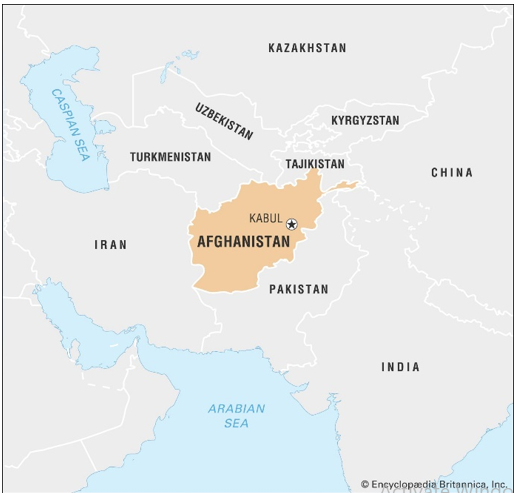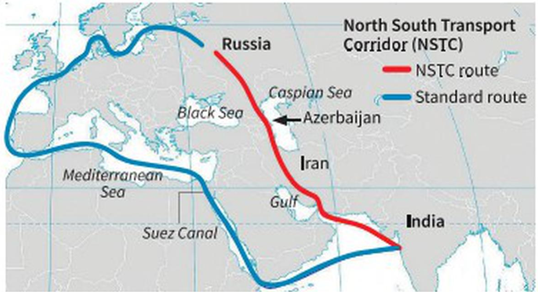

Context
The Taliban (who govern Afghanistan) is working with Kazakhstan and Turkmenistan to create a regional energy trade hub in western Afghanistan that would facilitate oil sales from Russia to South Asia. It marks a strategic move by the Taliban to leverage Afghanistan's geographical location and revive its economy through regional energy trade.
1: Dimension-Significance of the Agreement
- Strategic Location: Afghanistan's geographical location, situated between South and Central Asia and sharing borders with China and Iran, makes it strategically positioned for trade routes. Historically, Afghanistan served as a crucial point along the ancient Silk Road trade route.
- Multi-Modal Services: It will allow for the development of multi-modal services by consolidating truck shipments in the dry port where they will be sorted and sent along railroads on the North-South corridor to sea ports in the Gulf, Pakistan, and Indian Ocean, towards India.
- Development in Herat Province: The establishment of a logistics center in Herat province holds significance as it can serve as a pivotal link connecting northern regions to South Asia. This infrastructure development has the potential to boost economic activity and trade flows in the region.
- The trio noted that the eastern branch of the International North South Transport Corridor (INSTC) had gained new impetus to become a key route for transporting goods from Russia and Belarus through Kazakhstan and Turkmenistan to Afghanistan, India, and West Asia.
2: Dimension-Implication of the development
This initiative has implications not only for Afghanistan but also for neighboring countries and broader regional dynamics.
- Emerging as key player: The agreement to build a logistics hub signifies the Taliban's efforts to establish Afghanistan as a key player in regional trade, particularly in the energy sector.
- Diversification: By fostering partnerships with neighboring countries like Kazakhstan and Turkmenistan, the Taliban seeks to diversify Afghanistan's economy and reduce reliance on external aid.
- Benefit for Kazakhstan: The country is eyeing the development of roads and a railway through Afghanistan to have connections with the Gulf and South Asia. Currently, Kazakhstan’s crude oil exports are dependent on logistics in Russia and Russian ports on the Black Sea.
- Challenges:
- Security situation in Afghanistan remains fragile
- Concerns about the feasibility of infrastructure development projects.
- Geopolitical rivalries and regional dynamics
3: Dimension- Impact on India
- Economic Opportunities: Increased connectivity and trade facilitation could open up new economic opportunities for Indian businesses, especially in sectors such as energy, infrastructure development, and logistics.
- Energy Security: The development could contribute to India's energy security objectives. Access to energy resources from Central Asia and Russia via Afghanistan could diversify India's energy sources and reduce dependency on traditional suppliers.
- Connectivity and Regional Integration: Enhanced connectivity through the logistics hub could bolster India's efforts towards INSTC.
Fact Box: About INSTC
|



